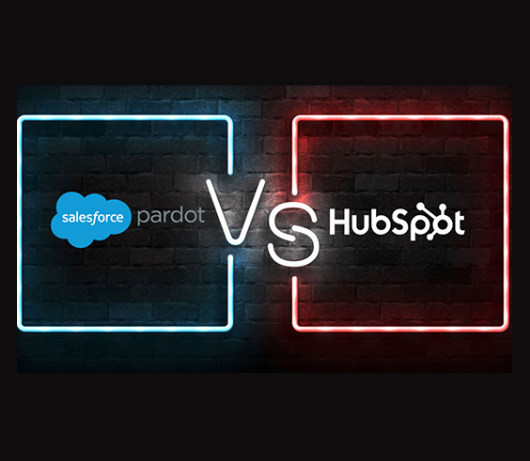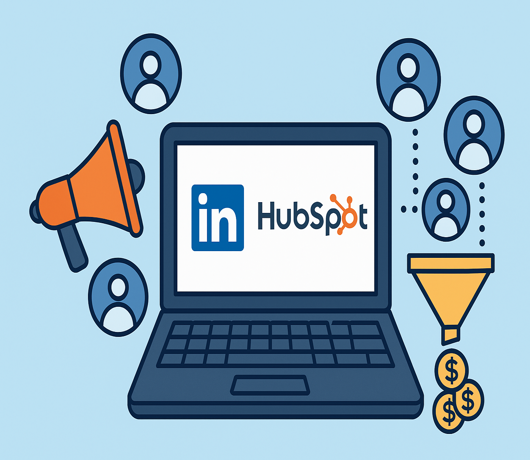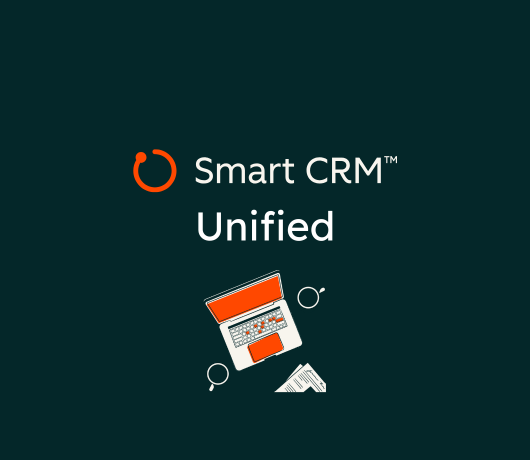HubSpot vs. Pardot (MCAE): Which Is the Best Fit for Your Business?
Navigating the world of marketing tools is crucial for keeping your business contacts organized and capitalizing on potential leads.
With platforms like HubSpot and Pardot—now branded as Marketing Cloud Account Engagement (MCAE)—the potential to create timely, meaningful connections and close more deals is immense.
But making the right choice between these two giants can be daunting. Let’s dive deep into each platform to provide a comprehensive guide that decision-makers can rely on when choosing the best tool for their organization.
Comprehensive Look: HubSpot vs. Pardot
HubSpot is renowned for its user-friendly nature and comprehensive CRM capabilities, catering to scalable companies (businesses designed to efficiently grow and expand their operations without proportionately increasing costs). It integrates various functions such as contact management, pipeline management, live chat, meeting scheduling, and prospect tracking and AI, all under one roof. Additionally, HubSpot offers specialized hubs like the Marketing Hub and Sales Hub to streamline both marketing and sales automation.
Pardot, renamed Marketing Cloud Account Engagement, is tailored for B2B marketing automation and fits seamlessly into the Salesforce ecosystem. Known for its sophisticated approach to lead management and customer journey workflows, Pardot is ideal for businesses that require deep, detailed marketing strategies and are already invested in Salesforce.
Great, so now we sort of know what each one of them does, but the question remains. Which one should you choose? Let’s dive in a little more.
Key Features and Functionalities
HubSpot: Known for its plug-and-play setup, HubSpot offers an incredibly intuitive interface that requires minimal technical know-how. Its seamless integration with various tools and in-house services ensures that businesses can get up and running quickly without the complications of extensive setups.
Pardot: While offering robust features, Pardot demands a more thorough understanding of its integration capabilities, particularly with Salesforce. This integration can be a double-edged sword—powerful if leveraged correctly but potentially complex for newcomers.
Marketing Automation Capabilities
HubSpot: HubSpot’s automation tools cover a wide array of functions from email marketing automation to social media scheduling, lead scoring, and nurturing campaigns. The platform also supports advanced segmentation, allowing marketers to tailor their approach to different audiences effectively.

Pardot: Specializes in comprehensive B2B marketing solutions including detailed lead scoring models and customizable lead nurturing programs. Its alignment with Salesforce enhances its capability to execute complex, multi-tiered marketing campaigns which are scalable and highly customizable.
Reporting and Analytics
HubSpot: Provides robust analytics tools that offer real-time insights into marketing performance. Users can access a variety of pre-built reports or customize their own to track everything from website performance to individual campaign effectiveness.

Pardot: Delivers deep analytics capabilities, especially in terms of B2B marketing metrics and Salesforce integration. However, the platform often requires additional setup and customization to fully utilize its reporting tools.
Customer Support and Resources
HubSpot: Offers an extensive array of support options including 24/7 live chat, phone support, and a comprehensive knowledge base filled with useful guides and tutorials. HubSpot Academy also offers free certifications and courses, empowering users to improve their marketing skills.

Pardot: While its support is robust, accessing in-depth assistance can sometimes be less straightforward than with HubSpot. Salesforce’s Trailhead educational platform provides an extensive array of learning modules, though these can be somewhat overwhelming for those new to the ecosystem.
Pricing and Scalability
HubSpot: Known for its transparent pricing structure, HubSpot offers several tiers that cater to different business sizes and needs, starting from a free tier to more advanced enterprise solutions. This flexibility makes HubSpot an attractive option for growth-minded businesses.
Pardot: Generally more expensive than HubSpot, Pardot’s pricing reflects its enterprise-level positioning and deep Salesforce integration. Its cost may be justifiable for large organizations that need extensive B2B marketing tools and already use Salesforce extensively.
Additional Considerations
Ease of Adoption
HubSpot is often preferred by organizations that value quick setup and ease of use, making it ideal for teams with limited IT resources.
Pardot requires a steeper learning curve and is best suited for teams that have or can develop a strong technical proficiency, especially those that are already familiar with Salesforce.
Industry Suitability
HubSpot works well across a variety of industries, thanks to its versatile and adaptable platform.
Pardot is particularly beneficial for B2B companies in sectors like technology and manufacturing, where complex sales cycles are common.
Final Verdict
When it comes down to choosing between HubSpot and Pardot (MCAE), the decision hinges on several critical factors that impact your daily operations and long-term strategic goals. Both platforms offer formidable capabilities in marketing automation, but HubSpot generally emerges as the more appealing option for a broad range of businesses, and here’s why:
Comprehensive Integration and Ease of Use: HubSpot is celebrated for its user-friendly interface and comprehensive integration capabilities. With its plug-and-play nature, businesses can quickly set up and integrate HubSpot with a variety of other tools and systems without the need for extensive technical expertise. This ease of deployment and use is a major plus for businesses that want to see immediate benefits from their marketing automation tool without a steep learning curve.
All-in-One Platform: Unlike Pardot, which requires additional Salesforce integration for complete functionality, HubSpot offers an all-in-one platform that combines CRM, marketing, sales, and customer service hubs. This integrated approach not only simplifies the user experience but also enhances data flow across different departments, making it easier to track customer interactions and measure the effectiveness of marketing campaigns in real-time.
Superior Customer Support and Resources: HubSpot goes above and beyond in providing support and educational resources to its users. With 24/7 live chat, extensive online tutorials, free certifications, and proactive community forums, HubSpot empowers users with the knowledge and tools needed to succeed. This level of support is particularly valuable for businesses looking to quickly upscale their marketing efforts without significant bumps along the way.
Cost-Effectiveness and Scalability: HubSpot’s transparent pricing structure offers tiers that cater to businesses of all sizes, from startups to large enterprises, providing flexibility and scalability. This makes it an attractive option for businesses looking to grow and expand their marketing capabilities without incurring prohibitive costs.
Adaptability Across Industries: HubSpot’s versatility makes it suitable for a wide array of industries, enabling more businesses to leverage its tools to meet specific marketing needs and customer engagement strategies. Whether you’re in tech, healthcare, education, or retail, HubSpot adapts to your unique challenges, helping you craft tailored marketing solutions.
HubSpot is celebrated for its user-friendly interface and comprehensive integration capabilities. With its plug-and-play nature, businesses can quickly set up and integrate HubSpot with a variety of other tools and systems without the need for extensive technical expertise. This ease of deployment and use is a major plus for businesses that want to see immediate benefits from their marketing automation tool without a steep learning curve
All-in-One Platform: Unlike Pardot, which requires additional Salesforce integration for complete functionality, HubSpot offers an all-in-one platform that combines CRM, marketing, sales, and customer service hubs. This integrated approach not only simplifies the user experience but also enhances data flow across different departments, making it easier to track customer interactions and measure the effectiveness of marketing campaigns in real-time.
Superior Customer Support and Resources: HubSpot goes above and beyond in providing support and educational resources to its users. With 24/7 live chat, extensive online tutorials, free certifications, and proactive community forums, HubSpot empowers users with the knowledge and tools needed to succeed. This level of support is particularly valuable for businesses looking to quickly upscale their marketing efforts without significant bumps along the way.
Cost-Effectiveness and Scalability: HubSpot’s transparent pricing structure offers tiers that cater to businesses of all sizes, from startups to large enterprises, providing flexibility and scalability. This makes it an attractive option for businesses looking to grow and expand their marketing capabilities without incurring prohibitive costs.
Adaptability Across Industries: HubSpot’s versatility makes it suitable for a wide array of industries, enabling more businesses to leverage its tools to meet specific marketing needs and customer engagement strategies. Whether you’re in tech, healthcare, education, or retail, HubSpot adapts to your unique challenges, helping you craft tailored marketing solutions.



